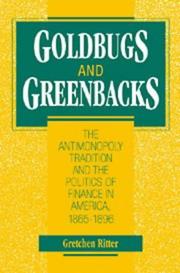| Listing 1 - 1 of 1 |
Sort by
|

ISBN: 0511807724 0521561671 0521653924 Year: 1997 Publisher: Cambridge : Cambridge University Press,
Abstract | Keywords | Export | Availability | Bookmark
 Loading...
Loading...Choose an application
- Reference Manager
- EndNote
- RefWorks (Direct export to RefWorks)
In the late-nineteenth century, there was a popular and heated debate over what sort of financial system America should have. Behind the discussions over gold versus silver and state versus national banks was a broader dialogue about sectionalism, class relations, and the future course of the American economy and democracy. Professor Ritter contends that there was a distinctive and neglected political tradition in the United States - the antimonopoly tradition - which was championed by nearly every major agricultural and labor group during the period from the Civil War until 1900. The book explains why the antimonopolists (including the National Labor Union, the Greenbackers, the Knights of Labor, and the Populists) saw the financial system as the key to maintaining economic opportunity and democratic control for all classes and regions.
Greenbacks. --- Paper money --- Gold standard --- Currency question --- Populism --- Political science --- Fiat money --- Free coinage --- Monetary question --- Scrip --- Currency crises --- Finance --- Finance, Public --- Legal tender --- Money --- Exchange standard, Gold --- Gold exchange standard --- Standard, Gold --- Gold --- International liquidity --- Bimetallism --- Bills (Paper money) --- Paper currency --- Inflation (Finance) --- History --- United States --- Politics and government --- Antimonopolism --- Numismatics --- Arts and Humanities
| Listing 1 - 1 of 1 |
Sort by
|

 Search
Search Feedback
Feedback About UniCat
About UniCat  Help
Help News
News